► Ghosn says he seeks ‘small compensation for damages’
► Ex-Nissan boss is still living as a fugitive in Lebanon
► Plus, full background on the Ghosn pay scandal
Former Nissan boss Carlos Ghosn has filed a $1bn (£773 million) lawsuit against his former employer. His case alleges defamation, slander, libel and the ‘fabrication of material evidence’ by Nissan and around a dozen individuals in relation to his pay scandal of 2018.
Ghosn filed the lawsuit with the public prosecutor in Lebanon, which is the country in which he has lived as a fugitive since his dramatic escape from Japan in 2019. He says his aim is obtain ‘small compensation for the damage’ the events have caused to his life.
During an online interview with the Financial Times, Ghosn said: ‘What I’m looking for is not revenge but I’m just trying to have a part of my rights back. I just want to make sure that all […] the plotters cannot sleep quietly in their bed after what they have committed.’
The former Nissan CEO claims he was pushed out of his position in a coup orchestrated by senior company managers. We delve deeper into this below, but the abridged version of event is Ghosn says his ousting was designed to disrupt Renault’s growing influence over decisions made at Nissan – and he has repeatedly denied all allegations against him.
In 2020, Ghosn explained his side of the story. ‘[I was] brutally taken from my work as I knew it,’ he said. ‘Ripped from my work, my family and my friends.’ He also claimed that he was kept in solitary confinement for 130 days in a windowless cell and that prosecutors pressured him to confessing in scenes violating international standards of justice. He said: ‘I did not escape justice, I fled injustice.’
How did Carlos Ghosn escape Japan?
After three years of secrecy, Ghosn finally explained how he fled Japan. He bared all during an interview with the BBC in July 2021.
Ghosn was arrested in November 2018 at Tokyo airport and spent the next year passing between periods police custody and house arrest (after he was granted bail). It was during one period of house arrest, when he was told he would not be allowed any contact with his wife, that he decided to plan his escape.
He disguised himself in plain clothes, then travelled from Tokyo to Osaka on the bullet train. When he reached Osaka, he visited a nearby hotel where a large flight case was waiting for him. He was sealed inside the box, transported to the airport by two men posing as musicians and loaded onto a private jet bound for Turkey.
Once he arrived in Turkey, Ghosn transferred to a different aircraft and flew to Beirut – and, because Lebanon hasn’t signed an extradition treaty with Japan, he has been allowed to remain there. However, Ghosn’s American accomplices have since been handed over to the Japanese authorities and are now facing three years in prison for their involvement in his escape.
Shortly after completing his escape, Ghosn confirmed: ‘I am now in Lebanon and will no longer be held hostage by a rigged Japanese justice system where guilt is presumed, discrimination is rampant, and basic human rights are denied.’
Ghosn claims he was forced to ‘escaped injustice and political persecution’ – even to the surprise of his own lawyers. One of his Japanese legal team, Junichiro Hironaka, called his escape ‘inexcusable behaviour.’
Carlos Ghosn: the story so far
Until his brazen escape from Tokyo, where he had lodged 1 billion yen (£7 million) in bail fees, Ghosn had been awaiting trial on charges of underreporting his pay, making illegal payments to a Nissan distributor in Oman and diverting money from the company for his own personal spending. He denies all charges.
Ghosn released a video statement protesting his innocence in spring 2019, days after he was rearrested in the ongoing investigation into his financial affairs. You can watch the video below, where he blamed Nissan senior executives for ‘playing a dirty game’ and blaming him instead of fixing the car maker’s worsening performance.
The former Nissan chairman had aimed to hold a press conference, but was rearrested on a new line of inquiry preventing him from talking to the world’s media. According to the Financial Times, his second arrest was related to an alleged $5 million sent by a Nissan subsidiary to an overseas dealership which ended up being diverted to a company controlled by Ghosn.
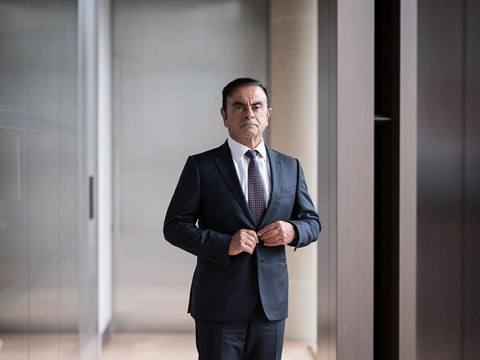
Shin Kukimoto, deputy chief prosecutor at the Tokyo District Prosecutor’s Office, told reporters at the time: ‘We now have a totally different case, and we are only doing what we think is right. As a result of our investigation, we have a new case in which he must be detained, and we have appropriately obtained an arrest warrant from the court.’
Ghosn didn’t take the charges lying down, though. ‘My arrest this morning is outrageous and arbitrary,’ he said. ‘It is part of another attempt by some individuals at Nissan to silence me by misleading the prosecutors. Why arrest me except to try to break me? I will not be broken. I am innocent of the groundless charges and accusations against me.’
Carlos Ghosn joined Twitter during his incarceration. He used to platform to publicise his plans for a press conference that promised to spill the beans on his removal from one of the world’s biggest car making alliances. The press conference was scheduled for Thursday 11 April 2019.
In March 2019, Ghosn was eventually released from the Tokyo detention centre where he was held for 108 days. He left the facility disguised as a workman wearing overalls, a cap and a face mask. His lawyer subsequently apologised for the idea, which backfired when assembled photographers shot him in his makeshift garb (below).
His exit was broadcast live on Japanese TV. If found guilty of misrepresenting his pay, he could face a lengthy prison sentence. In a bid to win in a legal system that has a 99% conviction rate, the former CEO has hired Takashi Takano, one of Japan’s top lawyers to fight his case.
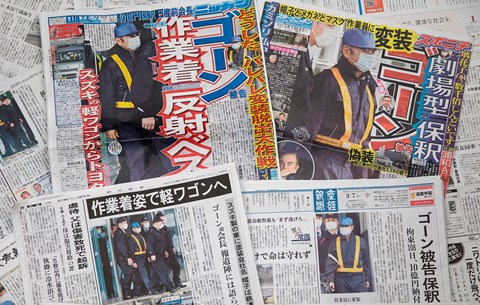
Ghosn was released on bail and was banned from leaving the country. He also agreed to forfeit his use of the internet and had to agree to having CCTV monitor his movements at an agreed residence in Tokyo. Sadly, for the Japanese legal system, these measures weren’t enough to prevent him slipping out of the country undetected.
Ghosn’s first interview since his arrest
In January 2019, Ghosn gave an interview in which he claimed he had been the subject of a ‘plot and treason.’ Speaking from jail in Japan, the former CEO said he had ‘no doubt’ that he was removed by powerful executives in Nissan who were worried about the proposed closer integration of the partner brands in the alliance.
Speaking to the Nikkei Asian Review from the Tokyo Detention House, where he’d been held for more than two months, Ghosn said that senior forces within Nissan wanted to ‘get rid’ of him when plans emerged last autumn to integrate Nissan, Renault and Mitsubishi more closely.
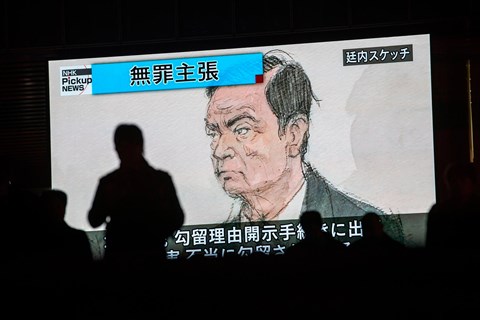
He protested his innocence and was adamant that the pay and homes around the globe had all been approved by the company’s benefits and legal teams. ‘I needed a safe place where I can work and receive people in both Brazil and Lebanon,’ he told the reporter.
Ghosn said, ‘there is up and down’ while he languished in jail but confirmed that his health was ‘doing fine.’ A court in Tokyo declined his second request for bail on 22 January 2019.
Carlos Ghosn steps down as CEO of Renault
Ghosn’s 2019 interview was made days after he stepped down as CEO of Renault. Until that point, Renault and the French government had supported his case, being under the assumption that he was innocent until proven guilty.
When Ghosn stepped down as CEO there was still no suggestion that he had fiddled his renumeration at Renault, but his fall from grace in Japan quickly made his position untenable. His exit made way for Thierry Bolloré (who was also brutally removed in the intervening months, in another bloody boardroom coup).
In a statement following the events, Renault said it was splitting its leadership by appointing a separate CEO and chairman, with the aim of adding tighter governance.
Ghosn was credited with turning around Renault and Nissan. He was also the architect of the Renault-Nissan-Mitsubishi Motors strategic alliance – and he backed the group’s pioneering move into mainstream electric cars.
Fresh allegations of financial misconduct
Ghosn’s exit from the Renault-Nissan alliance was by followed fresh allegations made in late January 2019 that he had received a further $9 million (£7 million) in improper payments from a joint venture between Nissan and Mitsubishi based in the Netherlands.
Nissan claims that Ghosn was compensated by the business without consulting two other board members – Nissan CEO Hiroto Saikawa and his counterpart at Mitsubishi, Osamu Masuko.
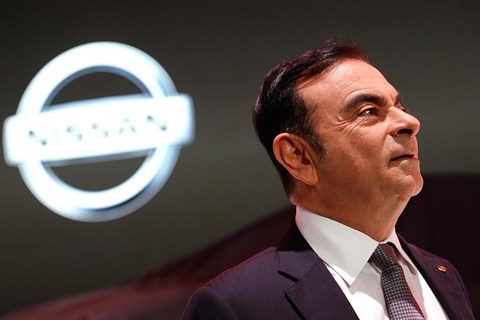
In a statement Nissan said: ‘Nissan views the payments Ghosn received from [the joint venture] to be the result of misconduct and will consider measures to recover from Ghosn the full sum.’
By this point, both Nissan and Mitsubishi had sacked him after he was arrested in 2018 for financial misconduct, misreporting his pay and breach of trust.
Carlos Ghosn in first court appearance
Ghosn publicly denied any wrongdoing in his first public appearance in court in Tokyo on 9 January 2019. Handcuffed and with a rope around his waist, a visibly thinner Ghosn said in a statement he had been ‘wrongly accused and unfairly detained.’
It was the first time he’d been seen in public since his arrest in November 2018. He had been held in a Japanese jail ever since, accused of misrepresenting his pay over an eight-year period, as well as using company assets to buy personal property and hide trading losses in the wake of the global recession a decade ago.
‘I have been wrongly accused and unfairly detained, based on meritless and unsubstantiated accusations,’ Ghosn told the Tokyo District Court. His defence also called on Japanese prosecutors to release him; so far, they had been unwilling to do so fearing he may tamper with evidence or witnesses, or flee abroad.
If found guilty, Ghosn faces up to 10 years in prison and a fine of up to 700 million yen (£5m), according to Japanese regulators.
Why Carlos Ghosn and Greg Kelly were arrested
In 2018, prosecutors in Tokyo indicted Carlos Ghosn and Greg Kelly, the two men at the centre of the pay scandal engulfing Nissan. The car maker was also indicted for misrepresenting its former chairman’s pay.
Both senior Nissan executives were re-arrested in 2019, extending the time they can be kept in jail. They had been held at a detention centre since 19 November 2018, when the scandal first broke, although Kelly was subsequently released.
‘Making false disclosures in annual securities reports greatly harms the integrity of Nissan’s public disclosures in the securities markets, and the company expresses its deepest regret,’ the company said. ‘Nissan will continue its efforts to strengthen its governance and compliance, including making accurate disclosures of corporate information.’
2018: not a good year to be a car boss
Why Carlos Ghosn was arrested over his pay
In 2018, one of the biggest car industry bosses in the world – Carlos Ghosn, chairman of Renault Nissan – was ousted from his role as chairman of Nissan.
The board voted unanimously to remove Ghosn and senior executive Greg Kelly ‘to minimise the potential impact and confusion on the day-to-day cooperation among the Alliance partners.’
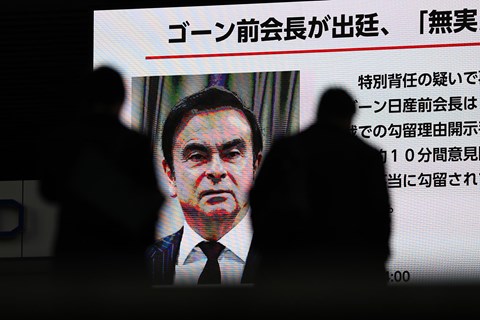
Both men were arrested in Tokyo amid claims they conspired to misrepresent the chairman’s pay over many years.
Emergency press conference: the new Nissan CEO speaks
‘I feel despair, indignation and resentment,’ Nissan chief executive Hiroto Saikawa (below) told an emergency news conference in Yokahama on 19 November, the day news broke. ‘As the details are disclosed I believe that people will feel the same way as I feel today.’
He confirmed Nissan’s plan to remove Ghosn, 64, from office. His immediate plan was to ‘stabilise the situation, and normalise day-to-day operations,’ Saikawa added.
‘Too much authority was given to one person in terms of governance. I have to say that this is a dark side of the Ghosn era which lasted for a long time.’ The CEO also said he was still pondering whether Ghosn was ‘a charismatic figure or a tyrant.’
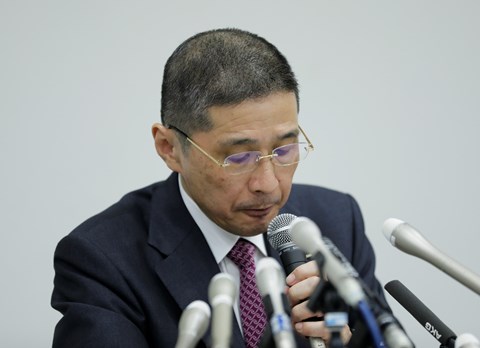
Unconfirmed local reports claim Ghosn under-reported an amount totalling 5 billion yen (£34 million) over a five-year period from 2011. At this point, Nissan had yet to reveal any amounts or details, but had admitted that ‘numerous other significant acts of misconduct [including] personal use of company assets’ were being investigated.
Ghosn was also accused of having company-paid houses in four countries, according to Japanese media. It was also alleged that the arrested men were planning retirement payment schemes.
Shares in Nissan fell by 4%, Mitsubishi was down by 7% and Renault stock hit a four-year low in Europe in the days after their arrest. This was because Ghosn was also CEO and chairman of Renault and chairman of Mitsubishi Motors.
Nissan statement on Carlos Ghosn pay investigation
Nissan said it had been investigating Ghosn’s compensation and pay packages for several months, as well as the actions of Greg Kelly, representative director at the company.
The statement read: ‘Based on a whistleblower report, Nissan Motor Co Ltd has been conducting an internal investigation over the past several months regarding misconduct involving the company’s chairman Carlos Ghosn and representative director Greg Kelly.
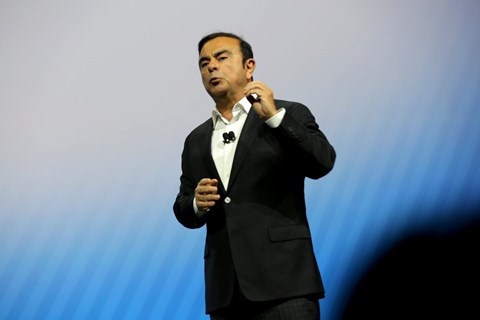
‘The investigation showed that over many years both Ghosn and Kelly have been reporting compensation amounts in the Tokyo Stock Exchange securities report that were less than the actual amount, in order to reduce the disclosed amount of Carlos Ghosn’s compensation.’
Ghosn and Kelly were unavailable for comment.
This is a breaking news story and we will update it as soon as we know more.